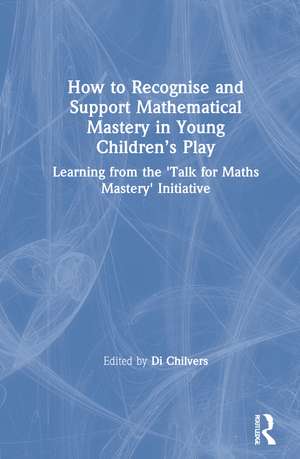How to Recognise and Support Mathematical Mastery in Young Children’s Play: Learning from the 'Talk for Maths Mastery' Initiative
Editat de Di Chilversen Limba Engleză Hardback – 13 iul 2021
The practical guidance has been carefully developed over a number of years and is based on research undertaken with primary schools in Sheffield as part of the 'Talk for Maths Mastery' initiative. It recognises that children’s mathematical development is embedded within child-led play and connected to deeper levels of thinking and wider dispositions for learning. Maths is happening everywhere at any moment; we just need to keep an open mind, open eyes, and listen.
Including case studies, links to practice and reflective questions, the chapters reveal what mastery orientation looks like from the children’s perspective in their learning and covers:
- children’s serve and return conversational talk
- mathematical babies and their developmental momentum
- schematic patterns of thinking
- mathematical mark-making
- child-led play
- problem solving
- creative and critical thinking
- how adults can support children’s mathematical talk, thinking and mastery
| Toate formatele și edițiile | Preț | Express |
|---|---|---|
| Paperback (1) | 193.53 lei 3-5 săpt. | +18.82 lei 10-14 zile |
| Taylor & Francis – 13 iul 2021 | 193.53 lei 3-5 săpt. | +18.82 lei 10-14 zile |
| Hardback (1) | 775.14 lei 6-8 săpt. | |
| Taylor & Francis – 13 iul 2021 | 775.14 lei 6-8 săpt. |
Preț: 775.14 lei
Preț vechi: 1033.83 lei
-25% Nou
Puncte Express: 1163
Preț estimativ în valută:
148.32€ • 155.28$ • 122.73£
148.32€ • 155.28$ • 122.73£
Carte tipărită la comandă
Livrare economică 05-19 aprilie
Preluare comenzi: 021 569.72.76
Specificații
ISBN-13: 9780367133566
ISBN-10: 0367133563
Pagini: 264
Ilustrații: 10 Line drawings, color; 130 Halftones, color; 24 Tables, color; 140 Illustrations, color
Dimensiuni: 210 x 297 mm
Greutate: 1.06 kg
Ediția:1
Editura: Taylor & Francis
Colecția Routledge
Locul publicării:Oxford, United Kingdom
ISBN-10: 0367133563
Pagini: 264
Ilustrații: 10 Line drawings, color; 130 Halftones, color; 24 Tables, color; 140 Illustrations, color
Dimensiuni: 210 x 297 mm
Greutate: 1.06 kg
Ediția:1
Editura: Taylor & Francis
Colecția Routledge
Locul publicării:Oxford, United Kingdom
Public țintă
Postgraduate, Professional, Professional Practice & Development, and UndergraduateNotă biografică
Di Chilvers is an advisory consultant, author and trainer at WatchMeGrow and the Development Map, UK.
Cuprins
1. What is Talk for Maths Mastery? 2. Maintaining the momentum of children’s mathematical development 3. What does mathematical mastery mean for young children? 4. Documenting children’s mathematical talking and thinking observation, learning stories and floor books 5. Building mathematical thinking through whole-class child-led learning 6. Making their mathematical mark: understanding and supporting children’s mathematical mark-making and thinking 7. How do adults support children’s mathematical talk, thinking and mastery? 8. Maintaining children’s mathematical momentum into Year 1 – a case study
Recenzii
"With an excellent layout and indexing, appendices of ready to use practical tools, real life learning ‘stories’, and full colour photographs, this is essential reading for early years practitioners looking to develop mathematical mastery in their work with the youngest students.
I particularly liked the concept of the ‘Maths is everywhere’ audit, encouraging adults to see that maths can happen anywhere, at any time. This book would make an excellent addition to the Continuing Professional Development library of any primary school." - Helen Emery, The School Librarian
I particularly liked the concept of the ‘Maths is everywhere’ audit, encouraging adults to see that maths can happen anywhere, at any time. This book would make an excellent addition to the Continuing Professional Development library of any primary school." - Helen Emery, The School Librarian
Descriere
This exciting book explores young children’s fascination with all things mathematical. Drawing on the Talk for Maths Mastery project, it helps practitioners to understand early mathematical development and recognise the maths taking place in children’s play.
